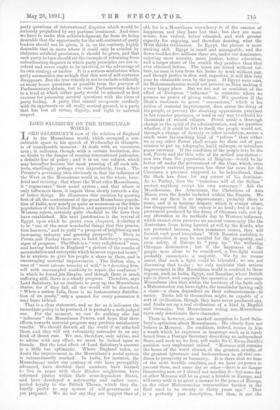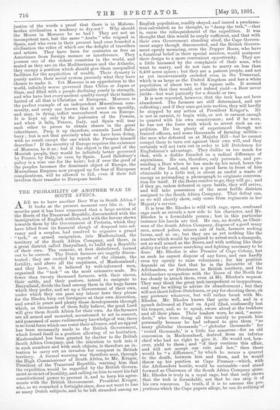LORD SALISBURY ON THE 31USSITLMAN WORLD.
TORD SALISBURY'S view of the relation of England to the Mussulman world, which occupied a con- siderable space in his speech of Wednesday at Glasgow, is of considerable moment. It deals with an enormous area ; it indicates, though with a certain hesitation, due no doubt to the danger of rousing international jealousies, a definite line of policy ; and it is on one subject, which may hereafter become the most pressing of all such sub- jects, startlingly, perhaps even imprudently, frank. The Premier's governing idea obviously is, that the influence of the West on the Mussulman world ia, on the whole, bene- ficial and reviving ; that where the West rules Mussulmans, it " regenerates" their social system ; and that where it only influences them, it impels them slowly towards a day of better things. He illustrates this position by quoting first of all, the contentment of the great Mussulman popula- tion of India, now nearly or quite as numerous as the white population of the United States, and apparently loyal to its Western rulers, certainly quite obedient to the laws they have established. His next justification is the revival of Egypt, upon which he grows oven eloquent, declaring it to be " one of the most wonderful things that this genera- tion has seen," and to yield " a prospect of brightening and increasing industry and growing prosperity. Even in Persia and Turkey there arc, in Lord Salisbury's opinion, signs of progress. The Shah is a " very enlightened ' man, and having beheld in England " a picture of the results of accumulation and enterprise which he never expected to see," he is anxious to give his people a share in them, and is encouraging material improvement. The Sultan also, a man of " most intense tenacity of will," is " devoting him- self with unexampled assiduity to repair the confusion " in which he found Jais Empire, and though there is much suffering still, there is a steady progress. Therefore, says Lord Salisbury, let us continue to prop up the Mussulman States, for if they fall, all the world will be disturbed. " When a nation falls, there is no testamentary distribu- tion of its goods," only a quarrel for every possession it may leave behind. That is a clear statement, and so far as it indicates the immediate policy to be pursued, it is probably a well-judged one. For the moment, we can do nothing else but " influence " the Mussulman Powers, and hope that their efforts towards material progress may produce satisfactory results. We should disturb all the world if we attacked them, and they will not voluntarily surrender to us any kind of direct rule. We can, therefore, only advise, and to advise with any effect, we must be looked upon as friends. But the total effect of Lord. Salisbury's account is a, little too optimistic. Where England rules, no doubt the improvement in the Mussulman's social system is extraordinarily marked. In India, for instance, the Mussulmans under our century of rule have perceptibly advanced, have doubled their numbers, have learned to live in peace with their Hindoo neighbours, have reformed justice within their semi-dependent States, and have developed a noteworthy and rather unex- pected loyalty to the British Throne, which they dis- tinctly prefer to any system of self-government as yet proposed. We do not say they are happier than of old, for to a Mussulman ascendency is of the essence of happiness, and they have lost that ; but they are more secure, less violent, better educated, and with greater capacity for enjoying, and therefore desiring, what the West thinks civilisation. In Egypt, the picture is more striking still. Egypt is small and manageable, and the down-trodden five millions there are, under our dominance, enjoying more security, more justice, better education, and a larger share of the wealth they produce than they ever obtained before. The taxes are levied without tor- ture, no man is torn from his home to work without pay, and though justice is slow and imperfect, it will this very year be obtainable even by the poor. If Egypt were ours, its Mahommedanism would not prevent us from making it a very happy place. But we are not so confident of the effect of European " influence " in countries where we possess no power of giving orders. We question if the Shah's readiness to grant " concessions,' which is his notion of material improvement, does arrest the decay of his people, or prevent the shocking oppressions practised in his remoter provinces, or tend in any way to rebuild his thousands of ruined villages. Persia needs a thorough change in the spirit of its administration, and we question whether, if it could be left to itself, the people would not, through a change of dynasty or other revolution, secure a much more far-reaching kind of " reform " than either we or any other Power shall secure for them out of per- mission to put up telegraphs, build railways, or introduce paper currency. If the condition of the people is to be the test, Persia and the thin relic of its settled population— now less than the population of Belgium—would be far better off under the government of the Czar, which, even as regards material progress, has done far more for the Caucasus, a province supposed to be behiudhand, than the Shah has done for any corner of his dominion. As to Turkey, does the "tenacious will of the Sultan" protect anything except his own autocracy ? Ask the Macedonians, the Armenians, the Christians of Asia Minor, even the Arabs included within the Empire. We do not say there is no improvement ; probably there is some, and it is because despair, which is always silent, has disappeared that the outcry is so loud ; but it is im- provement produced by the decay of Ottoman rule, not by any alteration in its methods due to Western influence, which cannot even preserve an ancient community like the Nestorians from being harried at will by the Kurds, who are protected because, when resistance comes, they will furnish such good irregulars ! With Russian ambition to be controlled, it may be needful for the prosperity, and. even safety, of Europe to " prop up " the withering Ottoman domination ; but if the happiness of the people were alone to be considered, a free-fight would probably emancipate a majority. We by no means assert that such a fight could be tolerated ; we are not discussing that to-day ; we only maintain that serious improvement in the Mussulman world is confined to those regions, such as India, Egypt, and Zanzibar, where British rule is direct, and suspends the operation of the sovereign Mussulman idea that within the territory of the faith only a Mahommedan can have rights, the remainder having only a claim—a claim dependent on their submissiveness—to mercy. Turks loft to themselves might be capable of a sort of civilisation, though they have never produced anv, and Arabs set up a real civilisation of a kind in Bagdad and Granada ; but Mussulmans ruling non-Mussulman races only deteriorate their character.
There is, however, one marked exception to Lord Salis- bury's optimism about Mussulmans. He clearly does not believe in Morocco. Its condition, indeed, rouses in him a wrath which he expresses in language such as is rarely heard from a Foreign Secretary describing an independent State, and such as, we fear, will make Sir C. Ewan-Smith's position very unpleasant indeed. " Morocco still remains the home of the worst abuses, of the greatest cruelty, of the greatest ignorance and backwardness in all that con- duces to prosperity or humanity. It is there that we hear of the most terrible cruelties, and we have no power to prevent them, and some day or other—there is no danger threatening now, or I should not mention it—but some day or other Morocco will be as great a trouble to Europe, and will carry with it as great a menace to the peace of Europe, as the other Mahommedan communities further in the East used to be twenty or thirty years ago." That is a, perfectly just description, but then, is not the justice of the words a proof that there is in Mahom- medan civilisation a tendency to dry-rot ? Why should the Moors in Morocco be so bad ? They are not an incompetent race, but the same " Arabs " who reigned in Spain, and who even in their present land once founded a civilisation the relics of which are the delight of travellers and artists. They have been for centuries as free as Americans from foreign menace or interference. They possess one of the richest countries in the world, and seated as they are on the Mediterranean and the Atlantic, they occupy a position which should give them unequalled facilities for the acquisition of wealth. Their dynasty is purely native, their social system precisely what they have chosen to make it. Yet Morocco is an opprobrium to the world, infinitely worse governed than China or Japan or Siam, and filled with a people declining yearly in strength, and who have lost every ancient quality except their fanatic hatred of all that is Christian or European. Morocco is the perfect example of an independent Mussulman com- munity, and every one knows that it must die speedily, and may, in dying, inflict unnumbered woes on Europe. It is kept up only by the jealousies of the Powers, and when it falls, France, Italy, and Spain will tear each other to pieces to obtain shares in the great inheritance. Prop it up therefore, counsels Lord Salis- bury ; but is not that precisely what we have been doing, with no result except the one which the Premier himself describes P If the security of Europe requires the existence of Morocco, be it so ; but if the object is the good of the Moorish people, they would be infinitely better governed by France, by Italy, or even by Spain. Lord Salisbury's policy is a wise one for the hour; but if ever the good of the peoples becomes the dominant object of Europe, the Mussulman Empires now propped up for fear of European complications, will be allowed to fall, even if their fall involves their transfer to European hands.



































 Previous page
Previous page